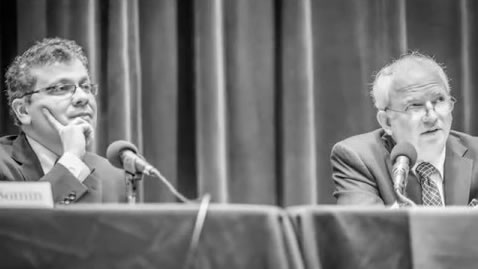Immigration Restrictions & the Constitution [FedSoc 5]
Transcript from short video featuring John Eastman and Ilya Somin
 A quick wrap-up of the immigration debate between Professors John Eastman and Ilya Somin from our 2016 National Student Symposium.
A quick wrap-up of the immigration debate between Professors John Eastman and Ilya Somin from our 2016 National Student Symposium.
Immigration restrictions keep millions of people stuck in impoverished countries – preventing them from improving their lives by moving somewhere else. However, some restrictions are clearly necessary to protect national security. And many say that our current laws do not go anywhere near far enough, arguing that additional restrictions are needed to prevent wage depression and the overburdening of our already-strained safety net. One way or another, immigration restrictions have an enormous impact on poverty, both domestically and abroad. But are such restrictions constitutional? This debate will address that question, along with the complex policy issues involved with the topic.
- Prof. John Eastman, Henry Salvatori Professor of Law & Community Service, Chapman University School of Law
- Prof. Ilya Somin, Professor of Law, George Mason University School of Law
Watch the video here.
Eastman: I'm John Eastman, I'm the Henry Salvatori professor of law and community service at Chapman University's Fowler school of law. Ilya Somin, a professor at a George Mason University, and I debated the issues about immigration at the Federalist Society’s Student Symposium.
Somin: My position on borders is very simple. There should be open borders, which means as a general rule, no restrictions on people's freedom of movement, based simply on where they happened to be born.
Eastman: My take on this is that every sovereign nation has the power to decide who it's going to admit into body of politic, inside it's borders and then continuing on to who will make full citizens.
Somin: Under modern Supreme Court precedent, Congress has almost unlimited power over immigration but this is not true under the original meaning of the Constitution. Quite simply there is no enumerated power in the Constitution which gives Congress the general power over immigration. It just simply doesn't exist.
Eastman: Deciding the rule on who are going to become citizens is given to Congress under the power of naturalization. And then deciding the rule on who will be allowed to enter into the country to begin that step towards naturalization, I think is necessarily a subsidiary power given to Congress, although it's implied rather than explicit. But setting the rule is a legislative act, not an executive act, in the way that deciding where to send out troops is, and so I think there's very good reason to think that Congress is the one that as that plenary of powers. The courts for more than a century have recognized.
Somin: The founders, just like we, perfectly well understood that people could live on U. S. territory without being citizens. Indeed even the very first naturalization act stated that people could come into the country but only after some period of years would they be eligible to become citizens. So Congress does have almost unlimited power over deciding which foreigners can become citizens. That is not the same thing as the power to restrict migration.
Eastman: We gave that policy, that judgment, that policy making authority to Congress because we knew there were a lot of variables: How many people from which parts of the world? How many people can you bring in from a despotic regime without undermining our own Republican institutions? Those are inherent balancing policy questions, and we gave them to the people who are most directly accountable to the sovereign authority in this country and that's our elected representatives in Congress.
Somin: If we allow freedom of movement that can massively improve the lives of millions of immigrants, and also by the way of large numbers of Americans who could then freely make transactions with these people. Economists estimate that if there were freedom of movement throughout the entire world that would close to double world GDP, and even more importantly it would be an enormous increase in freedom particularly for people who are fleeing poverty and oppression.
Eastman: It would prevent us from, for example, prohibiting criminals and paupers, the insane, people with communicable diseases from coming to this country and everybody at the founding generation thought it was an easy question could they be barred from entry.
Somin: I say we do so in exactly the same way that we prevent crime and terrorism by native born Americans: If we have evidence against particular people that they might be planning a violent crime or a terrorist attack, then by all means we can go after them and it would actually be easier to do this if we had open borders because we would free up all the resources that are currently spent in trying to apprehend people whose only crime is that they want to come into the U. S. and peacefully get jobs and improve their lives.
Eastman: An open borders policy essentially refuses to recognize that even though all human beings have inalienable rights, we come together as distinct peoples and distinct sovereigns in order to create government that we think is best to protecting those rights. And who we decide in this country as part of that body politic is part of the very essence of what it means to be sovereign. Open borders policy would ultimately destroy any notion of sovereignty.


